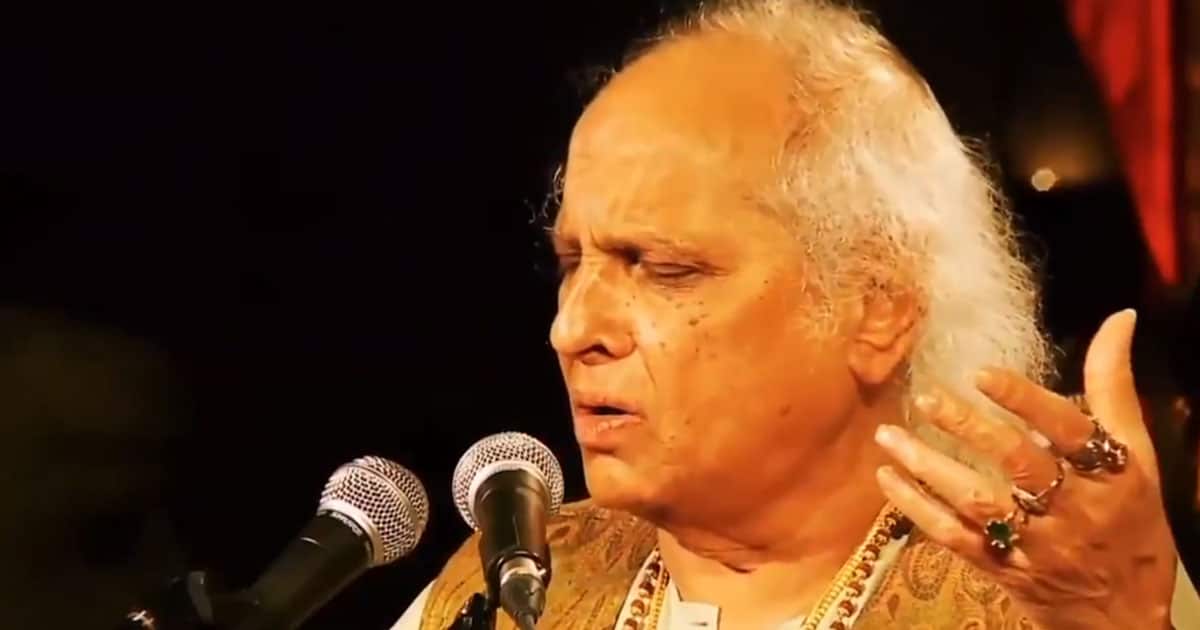The world of music is aghast.
On 17th August, the pioneer of Indian Classical Music, Shri Pandit Jasraj left for the heavenly abode at the age of 90 due to cardiac arrest. His musical career spanned more than 80 years resulting in national and international fame. He had performed in all the continents of the world making him the first and only musician to do so.

Jasraj’s demise is an irreparable loss to world music. End of an era.
All eyes on the Maestro!! pic.twitter.com/TkURWpfnEd
— Pandit Jasraj Fans (@ptjasrajfans) April 23, 2019
Pandit Jasraj was born on 28 January 1930 in Pili Mandori, a village in the Hisar district of Haryana. His father, Pandit Motiram was a classical singer. Pandit Motiram died in 1934 following which he was to be appointed as the state musician in the court of Mir Osman Ali Khan.
Jasraj was initiated into vocal music by his father yet he trained as a tabla accompanist under his elder brother, Pandit Pratap Narayan. He began training as a vocalist at the age of 14, after renouncing tabla in reaction to how accompanists were treated at the time.
Jasraj credits the vocalist Begum Akhtar for inspiring him to take up classical music. At the age of 22, he performed his first stage concert as a vocalist in the court of King Tribhuvan Bir Bikram Shah of Nepal in Kathmandu.
He spent his youth in Hyderabad and traveled often to Sanand in Gujarat to study music with musicians of the Mewati Gharana. Later, he performed for Maharaj Jaywant Singh Waghela, the Thakur Sahib of Sanand, who was deeply dedicated to classical music and received training from him.
Jasraj moved to Calcutta in 1946 where he began singing classical music for radio.
In 1962, Jasraj married Madhura Shantaram, the daughter of film director V. Shantaram. The couple had two children, a son, Shaarang Dev Pandit, and a daughter, Durga Jasraj.
#Wishing Smt Madhura Pandit Jasraj a very #HappyBirthday
Wishing you #happiness and #health !!#birthdaywishes #Legend #writer #Filmmaker #ClassicalMusic #indianmusic #mewatigharana #Ptjasraj #PanditJasraj #madhurajasraj #wifey pic.twitter.com/KlcHrr94Nh— Pandit Jasraj Fans (@ptjasrajfans) August 6, 2019
Although Jasraj belonged to the Mewati Gharana, he sang khayals with flexibility, adding elements of lighter styles, including the thumri. He created a novel form of jugalbandi called Jasrangi that is styled on the ancient system of moorchhana, between a male and a female vocalist, in which each sings different ragas at the same time. The legend was also known for presenting a variety of rare ragas including Abiri Todi and Patdeepaki. In addition to performing classical music, Jasraj had worked to popularise semi-classical musical styles, such as Haveli Sangeet.
From Last Evening in #Jaipur , #centralpark #lastevenig #concert #liveconcert #Ptjasraj #PanditJasraj #SundayMotivation #pinkcity #Rajasthan pic.twitter.com/owYFDf9zzD
— Pandit Jasraj Fans (@ptjasrajfans) February 9, 2020
The Padma Vibhushan awardee has sung classical and semi-classical compositions for film soundtracks, such as the song, ‘Vandana Karo’, composed in the raga Ahir Bhairav by the composer Vasant Desai, for the film Ladki Sahyadri Ki (1966), a duet with vocalist Bhimsen Joshi for the soundtrack of the film Birbal My Brother (1975), and a ballad, Vaada Tumse Hai Vaada for a horror film titled 1920 (2008) directed by Vikram Bhatt.
Twitter is abuzz with tributes to the legend.
It’s indeed a very sad day for the world of music. Pandit Jasraj’s passing away marks the end of an era. His musical approach and genius endeared him to the planet. His legacy lives on timelessly. I will miss him immensely musically and personally! May his soul Rest In Peace 🙏 pic.twitter.com/L7IMZ0XujG
— Amjad Ali Khan (@AAKSarod) August 17, 2020
Pandit Jasraj – a Life dedicated to exploring Music as a gateway to a higher possibility. A much celebrated Man who was unwaveringly devoted to his Path. –Sg#PanditJasraj pic.twitter.com/ZPio5M2AH7
— Sadhguru (@SadhguruJV) August 17, 2020
Artist #SudarshanPattnaik pays tribute to music legend #PanditJasraj with beautiful glass art pic.twitter.com/PlPloIcvdK
— ETimes (@etimes) August 18, 2020
He had a divine power to make the audience connect with the supreme being. This is the end of an era. Sangeet Martand #PanditJasraj ji’s no more. Very hard to accept the loss of one of the greatest artists of this country. Been very fortunate to have had his blessings on me. pic.twitter.com/9ckrlolSVG
— Shreya Ghoshal (@shreyaghoshal) August 17, 2020
The gentle maestro. The man who first introduced me to the beauty of Indian Classical Vocals. The power of his voice when he sang to his Devi, his Krishna, his Shiva. It was always a moving experience. Yes, #panditjasraj has left us. But his voice is immortal.
— Shekhar Kapur (@shekharkapur) August 17, 2020
Pandit Jasraj was a giant of Indian classical music & one of the country’s most influential vocalists.
I’m thankful to have witnessed several of his sublime performances, including one time in Parliament in 2007.
My deepest condolences to my friend @durgajasraj.#PanditJasraj pic.twitter.com/fR8cLstSIt
— Milind Deora मिलिंद देवरा (@milinddeora) August 17, 2020
Good bye my precious dadu. So many insanely beautiful memories you have given me.. but i have no words now #RIPPanditJasraj 🙏🏻 pic.twitter.com/q0LpCvrgr8
— Shweta Pandit (@ShwetaPandit7) August 17, 2020
Pandit Jasraj, the legend is no more. But his legacy will live forever. Rest in peace.

